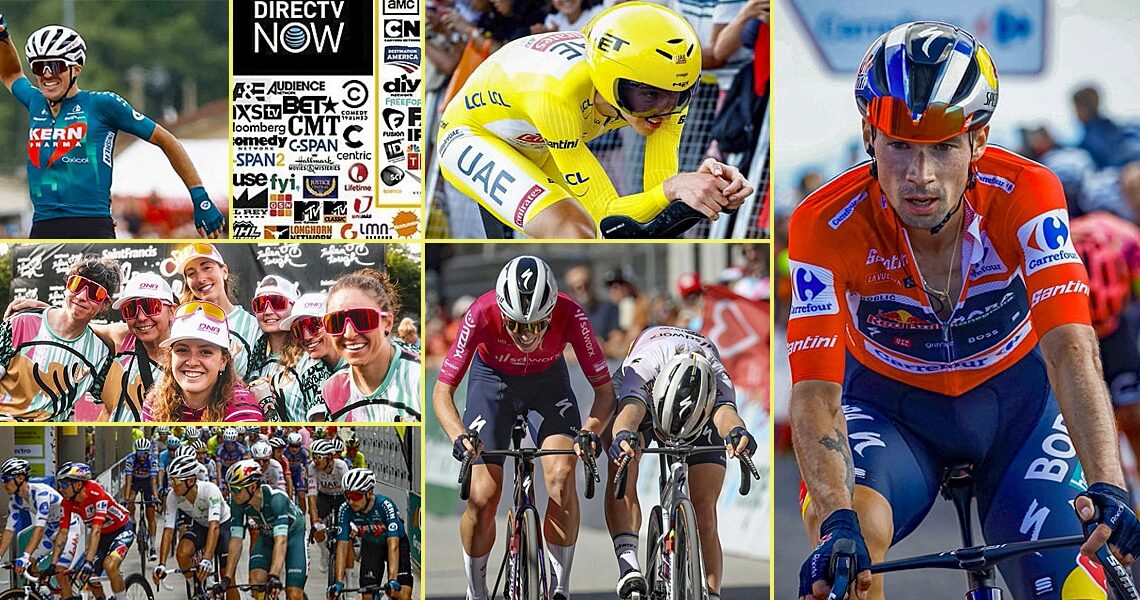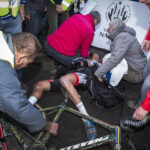In this week’s AIRmail newsletter, The Outer Line takes an in-depth look at: MSM weighs in on sports, the perfect race? Slovenia atop the cycling World, Kern Pharma’s cinderella run, DirecTV vs. Disney roils on, are sports valuations starting to plateau?
# Catch up on pro cycling – and its context within the broader world of sports – with AIRmail … Analysis, Insight and Reflections from The Outer Line. You can subscribe to AIRmail here, and check out The Outer Line’s extensive library of articles on the governance and economics of cycling here. #
Key Takeaways:
Sport: A Retreat from the American Zeitgeist
A Perfect Race Weekend?
Tiny Slovenia Sweeps the Grand Tours
Kern Pharma: Sacrifice, Humility and Eagerness
DirecTV vs. Disney Impasse Hurting Sports Fans
Is the Sports Valuation Frenzy Starting to Plateau?
Women’s sports for women viewers
You know there is a historic boom in sports team, event and rights valuations when the mainstream media starts to regularly weigh in. This past week it was the newly-minted Semafor Media podcast commenting on current developments – in particular, underlining the critical recent growth in women’s sports and the female audience; when sports broadcasters realized they could orient sports programs towards a female demographic, the “audience suddenly doubled.” The program also highlighted the growing importance of “big tech” (Amazon, Google, Netflix, etc.) in terms of driving the focus on sports rights, describing how sport can meet the varying needs and requirements of a wide range of broadcast players, and predicting that this valuation bubble must eventually burst. Former ESPN President John Skipper postulated that – more than anything else – soaring team valuations are simply a result of the number of billionaires in the world. The podcast also touched on the relative importance of culture vs. commerce in the growth of sports and suggested that current interest in sports may be partially driven by loneliness in our society, arguing that attention to sports has expanded as participation in organized religion, clubs and other social entities has fallen, particularly during COVID. Most interesting, it was suggested that perhaps the high level of interest in sports today represents a place where one can retreat from the current American zeitgeist, a “safe” area, and something – as opposed to politics – that one can safely discuss with both friends and strangers.
There was a big battle in Romandie last weekend
Is there such a thing as the perfect professional race weekend? Many pro cycling purists point to the men’s Criterium Internationale as the gold standard ‒ packing a sprint stage, a challenging hilly road race, and a time trial into a two-day package. But arguably the women’s Tour de Romandie should give the purists pause to consider how strong women’s pro cycling has become in the past few years, as the race produced a worthy winner and non-stop tactical action over a Friday-to-Sunday sequence. That’s if you were lucky enough to catch it on a live broadcast feed in any format – since it was competing for airtime with the more widely-distributed Vuelta’s final weekend and the Tour of Britain. Lotte Kopecky and Demi Vollering of SDWorx-Protime stole the show as expected. Elisa Balsamo (Lidl-Trek) snared the early lead on stage 1 with a well-timed sprint from the elite front group, but the mountaintop finish on stage 2, won by Vollering in a ferocious two-up drag race from teammate Kopecky, was an intense battle between the soon-to-be ex-teammates. The stage is now set for a war between the Dutch and Belgian pro women’s national teams at the upcoming 2024 world championships: Vollering (NL) and Kopecky (BE) going head to head without loyalty to trade team affiliation might be the best storyline in pro cycling not being exploited by broadcast media.
Vuelta win No.4 for Primoz Roglič
Back on the men’s side, Primož Roglič took the Vuelta title, finally reeling in long-time race leader Ben O’Connor, and also tying some historic records in the process. Roglič overcame a nearly five-minute deficit to grab a record-tying fourth career Vuelta title and fifth career Grand Tour overall win. His win also marked just the fourth time in history that all three grand tours have been won by a single nation: France (Anquetil and Poulidor) in 1964; Spain (Contador and Sastre) in 2008; Great Britain (Froome, Thomas, and Yates) in 2018; and Slovenia (Pogačar and Roglič) this year. Whereas the other entrants in this list hail from cycling powerhouse countries (Great Britain being a modern-era entrant), Slovenia is home to just two million people – roughly the same size as the greater Brussels municipality in Belgium or the U.S. state of Nebraska. That such a tiny nation can produce this cadre of peer-level sporting superstars (including current NBA position-redefining player Luka Dončić, Los Angeles Kings captain Anze Kopitar and numerous others) is unique – and demonstrates that the intersection of talent, environment, and coaching can pay huge dividends when effectively applied in a national system. Given that Slovenia only became an independent nation in 1991, it is perhaps no surprise that sport has become an integral component of its nation-building focus ‒ providing youth with life skills necessary to develop a strong workforce, but also a means to place the country front and center on the world stage in multiple sporting arenas.
Tadej Pogačar and Roglič gave Slovenia a clean sweep of the 2024 Grand Tours
With Roglič’s win, Red Bull has to be pretty happy with their off-season investment in Ralph Denk’s Bora outfit, even after a stomach bug ripped through his team in the last few days. Although top support riders Aleksandr Vlasov and Daniel Martínez were taken out by the illness, Roglič’s domestiques far outnumbered his rivals. In fact, out of the nine available Grand Tour podium spots in 2024, Red Bull-Bora tied the sport’s number one team, UAE Team Emirates, by capturing two, while last year’s dominant squad, Visma-Lease a Bike, was only able to manage one, the same total garnered by Decathlon-AG2R La Mondiale. While this is obviously only one metric of success, it has to be one that will be noted at Red Bull headquarters alongside the women’s pro surfing world title won by Red Bull-sponsored teen phenom Caity Simmers over the weekend. Red Bull’s recent hiring of British tech guru Dan Bigham is a signal that the firm intends to take bike racing seriously, and it will be interesting to see if they bring in other high-profile riders to the team during the off-season.
Are Red Bull shopping for more top talent?
Despite the Vuelta featuring an impressive and dominant performance from Roglič and a series of impressive stages from Wout van Aert, this year’s edition didn’t seem to really resonate with anyone but the most dedicated fans. This was partly because it didn’t tell us anything new about the main players. In contrast to last year, when the world watched Sepp Kuss rise to new heights and battle his own teammates en route to a watershed overall title, this year just saw the top GC riders perform roughly in line with their expectations. O’Connor did defy expectations to some extent by successfully holding on for second place despite being dropped on nearly every uphill finish, but he only found himself in that position by taking a massive chunk of time in a breakaway, which is exactly how he finished fourth at the 2021 Tour de France. Even with Roglič producing one of the best climbing performances of his career to win Stage 19, it still seems apparent that he is a step below Pogačar and Jonas Vingegaard and, at 34 years old, is unlikely to challenge them in the future. Finally, with the sport’s other top stars either inactive or racing at other events during the Vuelta, it was hard not to feel like 2024 was the year the Vuelta finally resumed its billing as the “third” grand tour after a few high-flying years. It is likely causing even the most dedicated fans to ask if non-Tour de France grand tours should be reduced to two weeks, and if that could entice more of the sport’s biggest names to be present?
Kern Pharma had a stunning Vuelta
The surprise of the season’s final grand tour was definitely the Cinderella run of the Equipo Kern Pharma team. The second-tier team, started just four years ago and supported by a family-owned Spanish generic pharmaceuticals firm, hardly expected to be invited to grand tours, let alone contest for stage wins. Yet, there they were, winning three stages at the Vuelta, contesting several others, and generally representing a sponsorship dream. The team’s budget, estimated at about $4 million – or less than ten percent of several of the top teams – once again reignites the on-going debate around the importance of money in winning. (For example, note Kern’s performance vis-à-vis Ineos this year.) As we reported last week, the team’s mastermind, Manolo Azcona died during the race and was sadly unable to witness his team’s historic success. But he and his Galibier Sports Association have been identifying and developing key Spanish-speaking riders for decades, including such figures as Joseba Beloki, Andrey Amador, Marc Soler, and Richard Carapaz, among others. Earlier this year, Manuel Garrido, CEO of Kern Pharma, summarized the team’s guiding principles as “sacrifice, humility, eagerness.”
Kern Pharma performed well above many WorldTour teams
The DirecTV vs. Disney contract impasse has essentially gone nuclear in the week since we first mentioned it, with all Disney content going dark over its third-largest (by subscriber) carrier network in the U.S. market. A major component of this relationship which will hurt Disney is the loss of viewership for ESPN’s flagship Monday Night Football broadcast coming edition on September 9th, as DirecTV’s market penetration and combination of public venue (bars and restaurants) and home viewership losses will be a big hit even for just one week of the season. To add injury, DirecTV lodged a formal complaint with the FCC concerning Disney’s negotiation tactics, tying the current impasse to the appeal a federal judge upheld against Disney’s sports streaming venture, Venu Sports ‒ in which the multi-party streaming package was deemed anti-competitive and detrimental to consumer choice. For reference, the first Monday Night game of last year’s NFL schedule drew nearly 23 million viewers, and last Thursday’s opening game of the 2024 season had some 28.9 million people watching. Undoubtedly, this will be leverage for DirecTV in the negotiations, as will other ESPN-related viewership drops like those also experienced by the weekend’s U.S. Open tennis finals.
No Disney on DirecTV
While sports have become a hitch-pin for the revenue trains of many broadcast networks, we may be reaching a ceiling in some markets and some sports. The NFL has been trying to expand its international presence by playing games in European markets with widespread success, but may have hit a wall with its poorly received and confusing matchup in Brazil this weekend. Likewise, France’s Ligue 1 took a huge hit over the summer when its media rights were essentially halved, and with the absence of stars like Kylian Mbappe, the league is likely to suffer through a dry transfer window for several seasons as the life-giving TV revenue pool runs thin and prevents big-name star transfers from bolstering the audience interest. The DirecTV-Disney war and Ligue 1’s fortunes present pro cycling with two sides of the broadcast coin: widespread content availability is an absolute necessity for growth and sustainability, but channel exclusivity and the lack of household-name “star” power can intersect to limit revenue potential. It’s not enough that the Tour de France and UCI WorldTour events are available across a multitude of outlets; the sport needs to build a compelling narrative for its men’s and women’s programs to make it valuable enough to negotiate premium exclusivities. We should be so lucky if pro cycling reaches a point where a broadcast negotiation impasse happens. Yet in contrast, there was such limited availability of the women’s exciting Tour de Romandie last weekend (see above) that the sporting world ‒ and cycling’s potential market ‒ was largely deprived of one of the best developing rivalries in all sports today, one which should now be used to drive fan interest before the moment is lost.
The Tour de Romandie should have had more coverage
# Catch up on pro cycling – and its context within the broader world of sports – with AIRmail … Analysis, Insight and Reflections from The Outer Line. You can subscribe to AIRmail here, and check out The Outer Line’s extensive library of articles on the governance and economics of cycling here. #
The post MSM Weighs in on Sports, The Perfect Race? Slovenia Atop the Cycling World, Kern Pharma’s Cinderella Run, DirecTV vs. Disney Roils On, Are Sports Valuations Starting to Plateau? appeared first on PezCycling News.




